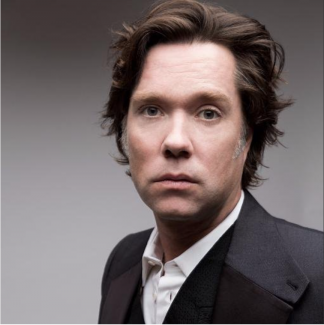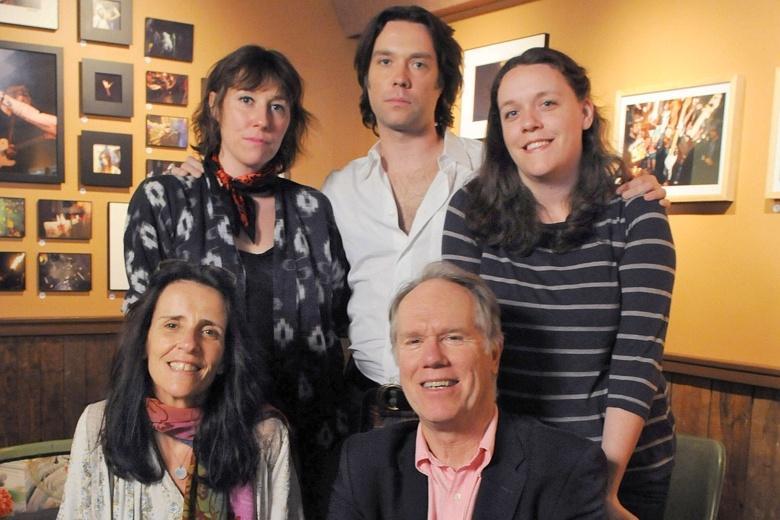by Steve Houk livingonmusic.com
“I just stepped out of the ocean to talk to you. I live…a blessed existence.”
 In many ways, Rufus Wainwright does live a blessed existence. He is a highly regarded and thoughtfully motivated singer/songwriter, all in all, a supremely talented 46-year-old man.
In many ways, Rufus Wainwright does live a blessed existence. He is a highly regarded and thoughtfully motivated singer/songwriter, all in all, a supremely talented 46-year-old man.
And despite the challenges of being raised amidst the musical dynasty of his family, plus dabbling with addiction and even going blind for a spell from it and living a lifestyle on the edge, Wainwright has survived and made it to here. He has taken those sparkling genes, added a pot full of his own talent and in the process, carved out a wonderful career with his own style of music that encompasses a swath of things, like love, literature, pop culture, politics all amidst a swirling sea of sounds and moods.
Oh, and lest we forget his love of opera and musical theater as delicious icing on his multi-layered cake.
A fascinating, diverse and eclectic artist, to say the least, Wainwright now travels the world sharing his thoughts and emotions through his wide scope of music. “I’m here and there, I’m basically a troubadour, a traditional troubadour, working the circuit,” Wainwright said as he was taking a break during his current Oh Solo Wainwright: An Evening With Rufus tour that stops at the Birchmere on August 22nd. “I’m kind of in-between columns for the moment. I just finished a big 20th-anniversary tour for my first two albums, revisited the ‘scene of the crime’ shall we say.
Now, I’m hopefully ready to commit another ‘crime’ with my new record coming out in the spring. I consider my first album and the one coming out next to be sort of bookends of my career as a songwriter, something that I chose at a very young age.
Wainwright is sincerely grateful to be where he is today, a successful working musician, beloved by a dedicated fan base and respected by his peers. He even has a second opera playing in Canada that he hopes will tour before too long.
“I have to pinch myself every day,” Wainwright admits, “because I’m doing exactly what I wanted to do. Be it songwriting, or opera, or musical theater, or even singing Judy Garland songs. I’m incredibly excited about all of that.”
As famous names often do, the name Wainwright carries with it a moniker of success and a legacy of deep musical heritage; Rufus’ father Loudon Wainwright, his late mother Kate McGarrigle and sisters Martha and Lucy Wainwright, even his uncle Sloan Wainwright all fall into that ‘exceptional musicians’ category.

(Top) Rufus Wainwright with sister Martha Wainwright (back left) and half-sister Lucy Wainwright Roche, (Bottom) Lucy’s mother Suzzy Roche and Loudon Wainwright (DAVID CORIO/REDFERNS)
But as many who have been down that road know all too well, a famous last name can also stick you with a label that can be both helpful and hurtful, so dealing with that aspect of his life has been a challenge that Wainwright has faced head-on, and ultimately, based on his now consistent success all on his own terms, has triumphed over.
“I am from a dynasty of songwriters,” Wainwright openly reflects. “On my mother’s side and my father’s side and also on my daughter’s side, and there’s a lot of power in that. On one hand, it can be a great advantage, but it can also be a great obstacle because in our family you have to define yourself, you have to really separate yourself from the herd a bit, in order to be appreciated properly, and that can be a great feat. But on the other hand, you do have a reputation and a foot in the door and that can’t be underestimated either.
It’s a strange balance, and in the end, it’s like anybody trying to be themselves.
It’s a lot of work.”
But although Wainwright is satisfied and confident that he has navigated his own musical path, a story told to him by a friend, one that crystallizes that family musical dynamic, clearly still resonates with him today.
“On one hand, sure, it’s important to do your own thing. But a friend who came to one of my shows, and my sisters were there and my Dad was there, she said it reminded her of when she was in India and she went to visit this palace, and there was a family that would sing outside this palace, and that was their job as a family, to sing in front of this palace, and it had lasted for hundreds of years. So yes, that is all meaningful. “
As Wainwright began to craft his own musical palette, he came to the realization early on that he would want to have his hands deeply immersed in a lush and changing landscape of music, only to find it a challenge to find a niche when you present such a potpourri of varied sounds.
“I had this vision when I started out that I would explore the world of music as if it were a jungle, and full of diversity. So I did that, but I was unaware how counterculture that was.
Once I kind of burst onto the scene, I thought that having all these different sounds and these different influences would be a (positive) aspect, but it turned out to be a deterrent, they just didn’t know how to peg me, what slot to put me in in the record shop, or the CD shop, or online, or whatever. For many years it was problematic and confusing for the audience, heh, and the marketers. But thankfully now in my mid-late forties, I have this body of work that once someone discovers my world, they can really be fulfilled on many, many fronts.”
Wainwright is also glaringly honest when he muses about his musical fantasies, and how that all figures into the current mix that encompasses who he is. “Of course I’m an American Pop freak, many people are, ya know, who would always want to be top of the charts, and make billions of dollars, and be on the cover of every magazine. There’s a still a little side of me that wished I could be that way. But in my older years I’ve really tempered that, although I may still use the energy of that dream when I get up on stage, I’m really focused on the music and the beauty of the art.”

Rufus (R) with husband Jorn Weisbrodt (Instagram #rufuswainwright)
When talking about as important and current a topic like living as a gay man in 2019 America, Wainwright is open and direct when he says he feels that the LGBT movement needs to remember some of its more vulnerable members, and not make it just about what’s easier or more fashionable to support.
“Being a gay white man is tricky at the moment. I do feel gay white men, of which I am, are a little bit under the spell of commercialism, ya know, the corporatization of gay pride, of having perfect bodies, and all about the fashion world, and I’m not discounting that as an existence because I can fall into that trap occasionally as well, and yes I think it’s important to have self-worth and be healthy and so forth. On the other hand, with the government we have now, it’s important to remember that there are other members of the LGBT community who are really on fire, much more than we are. That’s people of color, the transgender community, and others who are really getting the short end of the stick. I think it’s just really important to remember that we’re all in this together.”
When all is said and done, Rufus Wainwright does live a blessed life, overcoming the potential road bumps of his famous name while also embracing its legacy, and letting his wondrously diverse and imaginative mind lead the way into a multitude of new and thrilling musical places.
“And that is very unique,” Wainwright said, “there’s not a lot of artists where you can say to someone, ‘Well, maybe you’re not into Judy Garland, but maybe you’re into opera, or maybe you’re into folk music or you’re into love songs…ya know, he has a lot to offer.’ So to categorically dismiss me is…somewhat impossible.”
Rufus Wainwright with special guest The Rails performs Thursday, August 22nd at the Birchmere, 3701 Mount Vernon Avenue, Alexandria VA 22305. For tickets click here.




